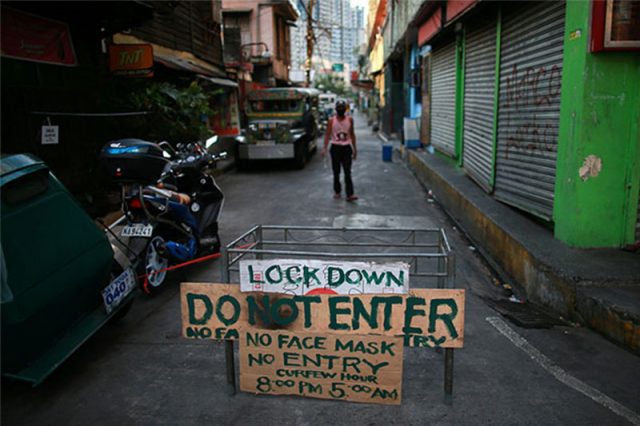
Where were you during the first day of the Metro Manila lockdown?
Filipinos recalled the early moments of the “community quarantine” that the government imposed three years ago which started prolonged stay-at-home orders as preventive measures against COVID-19.
March 15, 2020, a Sunday, was the first day that residents of the National Capital Region felt the effects of the measure which was supposed to last until April 14 of the same year.
Days before that, then-president Rodrigo Duterte announced a 30-day quarantine over Metro Manila after the Inter-Agency Task Force for the Management of Emerging Infectious Diseases (IATF-EID) raised the code alert system for COVID-19 to Code Red Sublevel Two.
This was outlined in the IATF-EID’s Resolution No. 11 (series of 2020), which declared that “community quarantine is hereby imposed in the entirety of Metro Manila.”
In it, class suspensions were declared extended until April 12, 2020.
RELATED: Nostalgia as Pinoys mark 3rd anniversary of week-long #WalangPasok due to COVID-19
The resolution significantly limited travel in and out of Metro Manila, with checkpoints installed in the NCR’s boundaries.
A travel ban was also imposed to bar foreigners from entering the country via land, sea, and air.
That period was additionally the start of the enforcement of physical distancing measures in public transportation.
It was also the start of the implementation of “flexible work arrangements” in the private sector, while government agencies had a skeletal workforce.
By March 17, 2020, two days after NCR was placed on “community quarantine,” the IATF-EID placed the entire Luzon under an “enhanced community quarantine” or ECQ.
It would be the start of a series of modified lockdowns imposed to limit the movements of the public in a bid to reduce the spread of COVID-19.
The stay-at-home order would also give birth to different quarantine trends among Filipinos, such as making dalgona coffee and ube cheese pandesal, signing up for TikTok, playing “Animal Crossing,” and sprucing up living spaces with plants and greens.
The Philippines only entered its “new normal” phase on March 2022, when the government placed Metro Manila and other areas under the most lenient COVID-19 Alert Level 1.
From weeks to years
Meanwhile, Filipinos commemorated the third anniversary of the NCR’s “community quarantine” by going on a nostalgia trip as they recall the first days of what would be called “one of the world’s longest COVID-19 lockdowns.”
ALSO READ: Philippines makes it to int’l headlines with anniversary of ‘one of world’s longest lockdowns’
Former ABS-CBN data analyst head Edson Guido on Wednesday reshared pictures of traffic-free areas in Metro Manila and wrote with a grinning-with-sweat emoji:
“Three years ago during the first day of ECQ… Ito ‘yung akala natin ilang linggo lang ‘yung lockdown tapos normal na ulit ang lahat by April. Matagal na kung aabot pa ng May.”
Three years ago during the first day of ECQ…
Ito yung akala natin ilang linggo lang yung lockdown tapos normal na ulit ang lahat by April. Matagal na kung aabot pa ng May 😅
Ano pa yung mga naalala niyo nung panahon na yun? https://t.co/apyHxMbjEO
— Edson C. Guido (@EdsonCGuido) March 15, 2023
“‘Yung work namin sa logistics required us to go to work every day, never stopped, and [continued] business operations. Ghost town ang mga kalsada at that time. Creepy!” Jan J. Go, president and CEO of the Ernest Logistics Corporation, recalled.
“Mga panahon na lahat nag-v-vitamin C, cloth pa ang mask at isang alcohol lang per person. Hay, sobrang traumatic,” another Twitter user reminisced.
“Isang linggo lang daw, aba, naging 1 [one] year bigla (and counting)… finished my college thru distance learning, got my degree but didn’t feel like it [’cause] graduation was held online. And I might have had bouts with [Covid] already but I had no idea,” a different Pinoy shared.
“Around this time 3 [three] years ago, maaga ako pumila papasok ng grocery kasi lockdown na. Ako lang pwede lumabas ng bahay. Oras ang inabot bago nakapasok at oras din ang pila sa cashier. Nalipasan na ko ng gutom dahil past 3 [three] na ko nakauwi. Keri lang kasi fave ko mag-grocery,” recalled another Twitter user.
“Kailangan ng quarantine pass tapos one per household lang pwede lumabas. Ako ‘yung gumagawa ng lahat ng outside errands without public transport!!!” shared a different Filipino.
Fast forward three years later, the Philippines has already lifted its community quarantine measures and some schools are now conducting face-to-face classes, along with workers rendering shifts on-site.
Face masks have also become optional and active COVID-19 cases had declined to 9,084 as of March 14, compared to when it was logging more than 20,000 figures last year.
The Department of Health does not yet see a specific date for the end of the COVID-19 emergency but it said the Philippines is able to “manage the situation” now.
“‘Pag nagtuloy-tuloy ‘yan, maaring matapos na talaga ito,” DOH officer-in-charge Maria Rosario Vergeire said to reporters on Tuesday, March 14.









